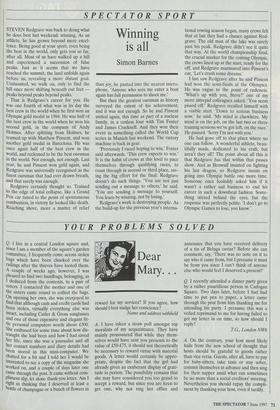SPECTATOR SPORT
Winning is all
Simon Barnes
STEVEN Redgrave was back to doing what he does best last weekend: winning. As an athlete, he has grown beyond mere excel- lence. Being good at your sport, even being the best in the world, only gets you so far, after all. Most of us have walked up a hill and experienced a succession of false peaks. Just as it seems that we have reached the summit, the land unfolds again before us, revealing a more distant goal. Undaunted, we walk on, only to find the hill once more shifting beneath our feet — peaks beyond peaks beyond peaks.
That is Redgrave's career for you. He was one fourth of what was in its day the best crew in the world when he first won an Olympic gold medal in 1984. He was half of the best crew in the world when he won his second gold, in the company of Andy Holmes. Alter splitting from Holmes, he teamed up with Matthew Pinsent, and won another gold medal in Barcelona. He was once again half of the best crew in the world, and reckoned to be the best oarsman in the world. Not enough, not enough. Last year, he and Pinsent won gold again, and Redgrave was universally recognised as the finest oarsman that had ever drawn breath, and that surely was enough.
Redgrave certainly thought so. Trained to the edge of total collapse, like a Grand Prix car tuned to the point of spontaneous combustion, in victory he looked like death. Reaching shore, more a matter of relief than joy, he panted into the nearest micro- phone, 'Anyone who sees me enter a boat again has full permission to shoot me.' But then the greatest oarsman in history surveyed the extent of his achievement, and it was not enough. So he and Pinsent united again, this time as part of a nuclear family, in a coxless four with Tim Foster and James Cracknell. And they won their event in something called the World Cup series in Munich last weekend. The victory machine is back in gear.
'Previously I raced hoping to win,' Foster said afterwards. 'This crew expects to win.' It is the habit of crews at this level to pace themselves through qualifying races, to coast through in second or third place, sav- ing the big effort for the final. Redgrave doesn't do such things. 'You are not just sending out a message to others,' he said. 'You are sending a message to yourself. You learn by winning, not by losing.'
Redgrave's work is destroying people. As the build-up for the previous year's interna- tional rowing season began, many crews felt that at last they had a chance against Red- grave. The old man of the lake was surely past his peak. Redgrave didn't see it quite that way. At the world championship final, the crucial marker for the coming Olympic, the crews lined up at the start, ready for the off, and Redgrave murmured into Pinsent's ear, 'Let's crush some dreams.'
I last saw Redgrave after he and Pinsent had won the semi-finals at the Olympics. He was vague to the point of rudeness. 'What's up with you, Steve?' one of my more intrepid colleagues asked. 'You seem pissed off.' Redgrave recalled himself with a visible start. 'Down to serious business now,' he said. 'My mind is elsewhere. My mind is on the job, on the last two or three training sessions we've got left, on the race.' He paused. 'Sorry I'm not with you.'
He had gone off to that place where no one can follow. A wonderful athlete, beau- tifully made, dedicated to his craft, but aren't they all? The point about all this is that Redgrave has that within that passes show. And as Beowulf insisted on fighting his last dragon, so Redgrave insists on going into Olympic battle one more time. Someone once foolishly asked him if it wasn't a rather sad business to end his career in such a downbeat fashion. Some- thing stirred behind the eyes, but the response was perfectly polite: 'I don't go to Olympic Games to lose, you know.'










































































 Previous page
Previous page